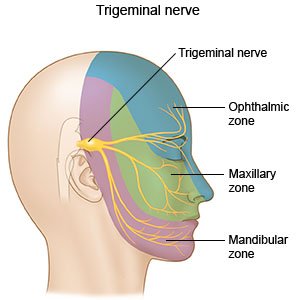Trigeminal Neuralgia
Medically reviewed by Drugs.com. Last updated on Sep 23, 2025.
AMBULATORY CARE:
Trigeminal neuralgia (TN)
is a nerve disorder that causes sudden attacks of severe facial pain. You have a trigeminal nerve on each side of your face. The nerves allow you to feel pain, touch, and temperature changes in different areas of your face.
 |
What can trigger a pain attack:
Most attacks are brought on by touching a trigger area on your face, such as from any of the following:
- Eating or drinking
- Smiling, yawning, or talking
- Shaving or washing your face
- Putting on makeup or combing your hair
- Wind or temperature changes
- Noise or lights
Common signs and symptoms of TN:
TN causes sudden, sharp, or burning pain. It normally occurs on one side of your face but can occur on both sides. You can go days to years without any TN attacks. You may have any of the following:
- Pain attacks that last from 1 second up to 2 minutes and repeat every few minutes to hours
- Pain attacks that get worse over time
- Pain that is so severe you cannot eat, drink, or speak
- Spasms in your facial muscles during your pain attack
Call your local emergency number (911 in the US) if:
- You are feeling so depressed you want to harm yourself.
- You are confused and cannot think clearly.
- You have sudden dizziness, or problems with movement, weakness, or numbness in your face.
Seek care immediately if:
- You have a fever, stiff neck, or develop a rash or peeling skin.
- You are not eating or drinking, and you are losing weight.
- You have eye pain, eye numbness, or sudden vision or hearing changes.
Related medications
Call your doctor or neurologist if:
- The medicines you are taking are not decreasing your TN pain.
- You feel worried or depressed and find it hard to do your daily activities.
- You have headaches, mouth sores, an upset stomach, or diarrhea.
- Your TN pain feels worse, different, or moves to another area of your face.
Treatment
may not be needed. If your TN is caused by another condition, your healthcare provider will also treat that condition. Any of the following may be used to treat TN that continues or becomes severe:
- Medicines may be given to relieve or prevent your symptoms.
- A procedure may be used to destroy an area deep in your skull where nerve branches come together. A needle and tube are put through the base of your skull to reach this area. The nerve impulses that cause your pain attacks may be blocked. The nerve may be destroyed with medicine injections or may be frozen. Part of the nerve may also be removed. Medicine may be injected to make you lose feeling in the painful area.
- Surgery may be needed if other treatment does not help. Surgery may be used to separate the trigeminal nerve from the blood vessel pressing on it. The blood vessel may also be removed.
Treatment options
The following list of medications are related to or used in the treatment of this condition.
Manage TN:
Even if you have not had symptoms for a long time, keep your medicines nearby. If your symptoms return, contact your healthcare provider before you start to take your medicines again.
Follow up with your doctor or neurologist as directed:
You may need to have blood tests to check your blood levels of certain medicines. Ask how often you need to return to have these blood tests. Write down your questions so you remember to ask them during your visits.
For more information:
- Trigeminal Neuralgia Association
2801 SW Archer Road
Gainesville , FL 32608
Phone: 1- 800 - 923-3608
Web Address: www.tna-support.org
© Copyright Merative 2025 Information is for End User's use only and may not be sold, redistributed or otherwise used for commercial purposes.
The above information is an educational aid only. It is not intended as medical advice for individual conditions or treatments. Talk to your doctor, nurse or pharmacist before following any medical regimen to see if it is safe and effective for you.
Learn more about Trigeminal Neuralgia
Treatment options
Care guides
Further information
Always consult your healthcare provider to ensure the information displayed on this page applies to your personal circumstances.
